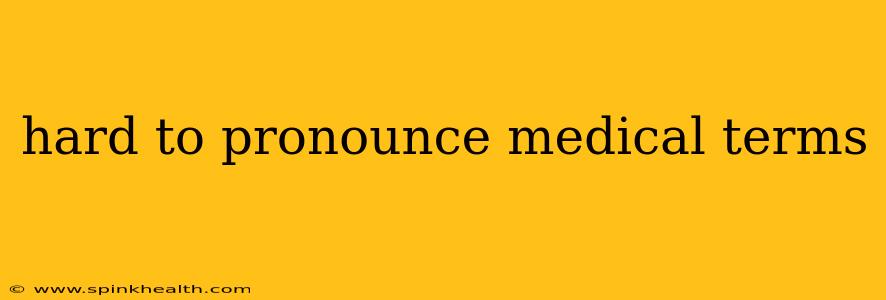Have you ever been in a doctor's office, listening intently, only to be completely thrown off by a medical term that sounds like it belongs in a fantasy novel? You're not alone. The medical field is riddled with long, complex words that can leave even seasoned professionals scratching their heads (sometimes). This isn't just about sounding smart; understanding these terms is crucial for patients to actively participate in their healthcare. Let's unravel some of these linguistic puzzles and conquer those tricky pronunciations together.
Why Are Medical Terms So Hard to Pronounce?
Many medical terms are derived from Greek and Latin roots. Imagine trying to piece together a puzzle where the pieces are ancient languages. It's a fascinating history, but it makes for some challenging vocabulary! The sheer length of some words, often combining multiple roots and suffixes, adds another layer of difficulty.
Think of it like this: "Pneumonoultramicroscopicsilicovolcanoconiosis" (a lung disease caused by inhaling very fine silica dust) is a word that's hard to say and even harder to spell, not just because it's long, but because of its complex origins.
What Are Some of the Most Difficult Medical Terms to Pronounce?
This is subjective, of course, depending on your background and familiarity with medical jargon. However, some consistently trip people up. Let's tackle a few infamous examples:
1. Pneumonoultramicroscopicsilicovolcanoconiosis:
We've already met this behemoth. It’s not just difficult to say, but it’s also a tongue twister of epic proportions. Even breaking it down into its parts doesn't necessarily make it easy! The key is to practice slowly, focusing on each syllable.
2. Sesamoiditis:
This inflammation of the sesamoid bones (small bones embedded in tendons) often affects the foot. The "ses-" sound can be tricky, and the overall rhythm of the word requires careful attention.
3. Gastroesophageal Reflux Disease (GERD):
While not one single word, GERD is a common acronym that often gets butchered in pronunciation. The emphasis on the correct syllables is key here.
4. Hypercalcemia:
This term, describing high levels of calcium in the blood, can be challenging due to the combination of sounds and the subtle pronunciation of the "c" and the "a"
5. Otorhinolaryngology:
Often shortened to "ENT," (Ear, Nose, and Throat), this specialty's full name is a mouthful. Each syllable needs careful articulation and a good understanding of pronunciation rules.
How Can I Improve My Pronunciation of Medical Terms?
Don't be discouraged! Mastering these terms is possible with practice and the right approach:
Break It Down:
Divide long words into smaller, manageable parts (syllables). Focus on each syllable individually before attempting to combine them.
Use Resources:
Medical dictionaries provide phonetic pronunciations (using symbols to show how words sound) and audio recordings.
Practice Aloud:
Say the words repeatedly until they roll off your tongue smoothly. Record yourself to identify areas that need improvement.
Ask for Clarification:
If you encounter a word you don't understand, don't hesitate to ask your healthcare provider for clarification. They're there to help you understand your health.
Why Is It Important to Understand Medical Terminology?
Beyond mere pronunciation, understanding medical terms empowers you:
- Better communication with healthcare professionals: You can participate more actively in conversations about your health.
- Enhanced comprehension of medical information: You'll understand test results, diagnoses, and treatment plans more clearly.
- Improved health outcomes: Active participation in your care leads to better decisions and better health outcomes.
This journey into the world of difficult-to-pronounce medical terms isn't just about linguistic prowess. It's about empowerment, communication, and taking charge of your health. So, don't be afraid to tackle these words head-on – your health will thank you for it.

